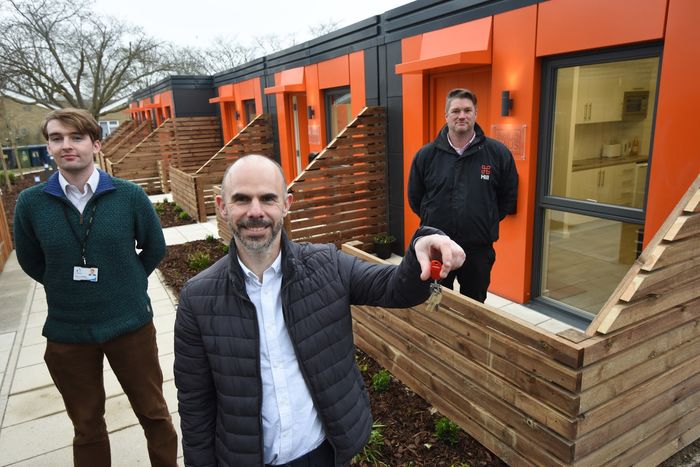Cambridge organisation awarded £30,000 grant to help tackle food poverty
Cambridge Sustainable Food Partnership has received a grant to fund further initiatives across the city to support individuals struggling financially

The Cambridge Sustainable Food Partnership (CSF) has received a £30,000 Food Resilience Grant in recognition of their ongoing community work. The grant was awarded to them by Sustainable Food Places (SPF), a network of food partnerships across the UK advocating healthy and sustainable food.
CSF are a partnership of several organisations in Cambridge promoting a “fairer, more sustainable food system which supports the community and the environment.” They have been coordinating emergency food provision to struggling locals throughout the Covid-19 crisis, using their eight community food hubs.
The grant must be spent between April and October 2021, and CSF will use it to fund new initiatives tackling issues of food poverty and sustainable local food systems across the city. They hope to establish long term, resilient solutions to these problems.
In a recent press release, CSF have outlined several upcoming projects that the grant will support. The organisation plans to build on their current work, with a key focus on transitioning from emergency food supply to a more reliable and affordable food system.
One future project will be the support of three local food hubs in low-income areas (Abbey People Food Hub, Cherry Hinton Food Hub and Trumpington Food Hub) where they plan to identify the local community’s needs, and then develop tailored initiatives such as cookery workshops and food growing activities.
Another key focus is to increase community skills and knowledge around food. The grant will help to support Cambridge’s first community farm, CoFarm. CoFarm will organise activities with the local community to grow crops, and will donate most of its harvest to support the emergency food response. CoFarm’s donations are estimated to help make 13,250 meals for the local community.
In partnership with Cambridge city council, CSF will create a permanent Redistribution Hub and Community Kitchen, which will support the current network of hubs and provide a space for community learning.
Sam Dyer, Director and Coordinator of CSF said: “We have seen in the last year that these hubs have given people a sense of control and involvement in their local food system and plan to build on this by running a scheme that encourages hub users to also volunteer at the hubs and share their food knowledge.
“One hub user who already volunteers weekly has praised the benefits of getting involved stating that it increased her feelings of worth and productivity, with other hub volunteers now tutoring and mentoring her older children.”
One anonymous hub user said that the hub has “helped to feed my family and reduced stress of food and fear of going without food”, with another user commenting that “as a volunteer and a hub user I enjoy meeting people who come, and being able to help people in need.”
Cherry Hinton Food Hub have also issued a statement in support of the grant: “Since December 2020 we have welcomed 619 visitors to our food hub, and many of them tell us about the impact of COVID restrictions on their families in terms of continued job losses and wage cuts. The level of need does not show any signs of diminishing, and we anticipate it to continue as our city recovers from the socioeconomic effects of the pandemic.”
The CSF press release reported findings in a recent survey that 67% of food hub visitors have seen a reduced income during the last 6 months, with 57% reporting that they would struggle to feed their family without the food hubs.
CSF have made several notable efforts to support the community since the start of the pandemic. Over the Christmas period, they collaborated with Cambridge city council and Cambridge City Foodbank (CCF) to distribute over 500 hampers to local families in need.
Between March and December 2020, CSF delivered over 113 tons of food across their eight food hubs. In November 2020, they also partnered with Fitzwilliam College to prepare 200 meals for local families during the half-term, at which point the government had withdrawn free school meal vouchers.
Cambridge has been recognised as having some of the highest rates of inequality in the UK. CSF have tried to mitigate some of the effects of this inequality, with an average of 3,129 people visiting their eight community hubs monthly. Through the Cambridge Holiday Lunch Programme, an initiative which supports the families of children who would usually receive free school lunches, they have also distributed 18,066 meals and bags of ingredients to 429 low-income families.
 News / Cambridge student numbers fall amid nationwide decline14 April 2025
News / Cambridge student numbers fall amid nationwide decline14 April 2025 Lifestyle / First year, take two: returning after intermission14 April 2025
Lifestyle / First year, take two: returning after intermission14 April 2025 News / Greenwich House occupiers miss deadline to respond to University legal action15 April 2025
News / Greenwich House occupiers miss deadline to respond to University legal action15 April 2025 Comment / The Cambridge workload prioritises quantity over quality 16 April 2025
Comment / The Cambridge workload prioritises quantity over quality 16 April 2025 Sport / Cambridge celebrate clean sweep at Boat Race 202514 April 2025
Sport / Cambridge celebrate clean sweep at Boat Race 202514 April 2025





